Analysis of Palliative Care Frameworks in New Zealand (PUBH7015)
VerifiedAdded on 2023/04/04
|6
|1104
|463
Essay
AI Summary
This essay analyzes the frameworks guiding palliative and end-of-life care in New Zealand, with a specific focus on the Te Ara Whakapiri. It examines the impact of chronic conditions on patients and their families, highlighting the importance of holistic care, especially for Maori patients, emphasizing their spiritual needs. The essay also investigates the ethical and legal considerations within palliative care, including autonomy, beneficence, and non-maleficence. The author concludes that understanding and implementing these principles is crucial for ensuring quality of life and death for all patients. The essay utilizes scholarly resources to support its claims and provide a comprehensive overview of palliative care in the New Zealand context.
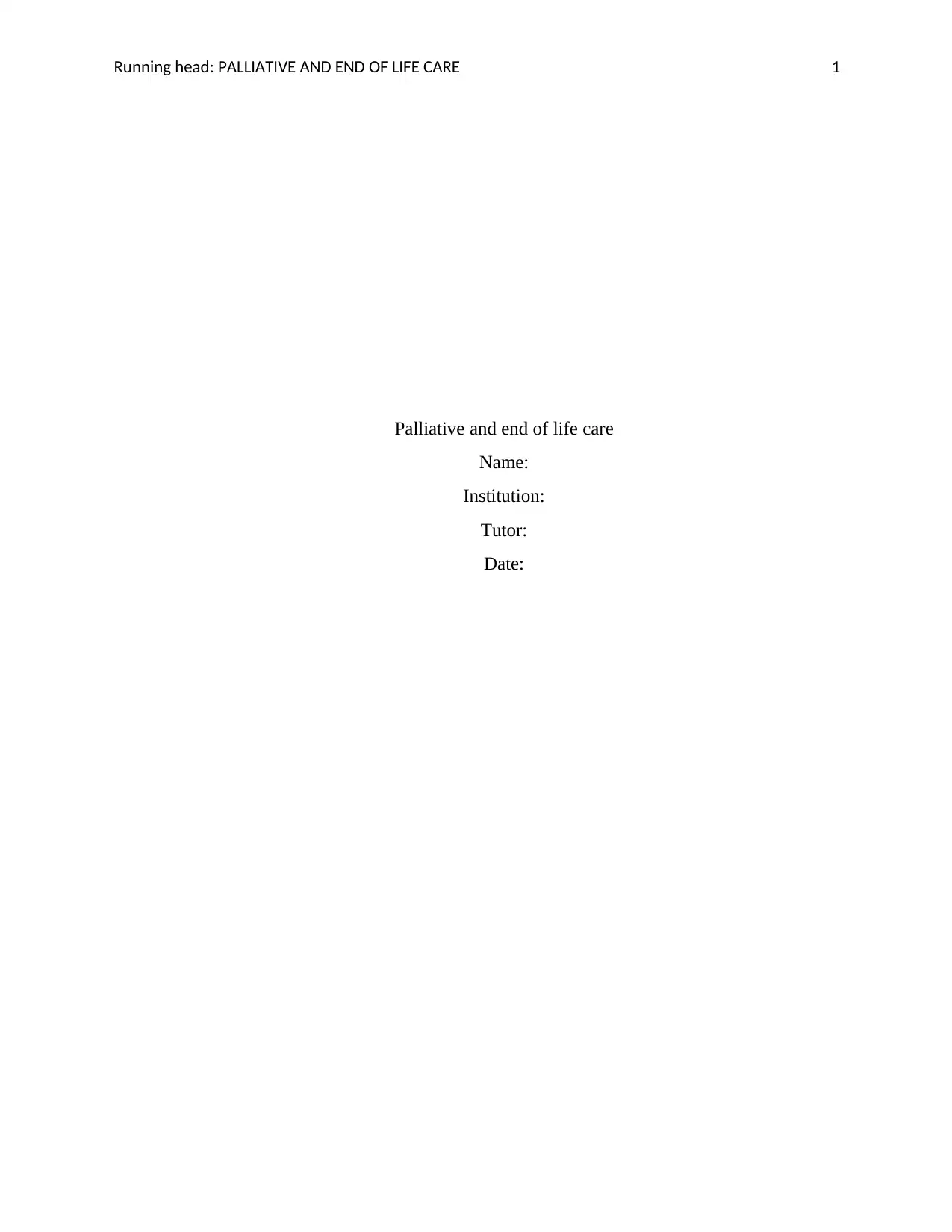
Running head: PALLIATIVE AND END OF LIFE CARE 1
Palliative and end of life care
Name:
Institution:
Tutor:
Date:
Palliative and end of life care
Name:
Institution:
Tutor:
Date:
Paraphrase This Document
Need a fresh take? Get an instant paraphrase of this document with our AI Paraphraser
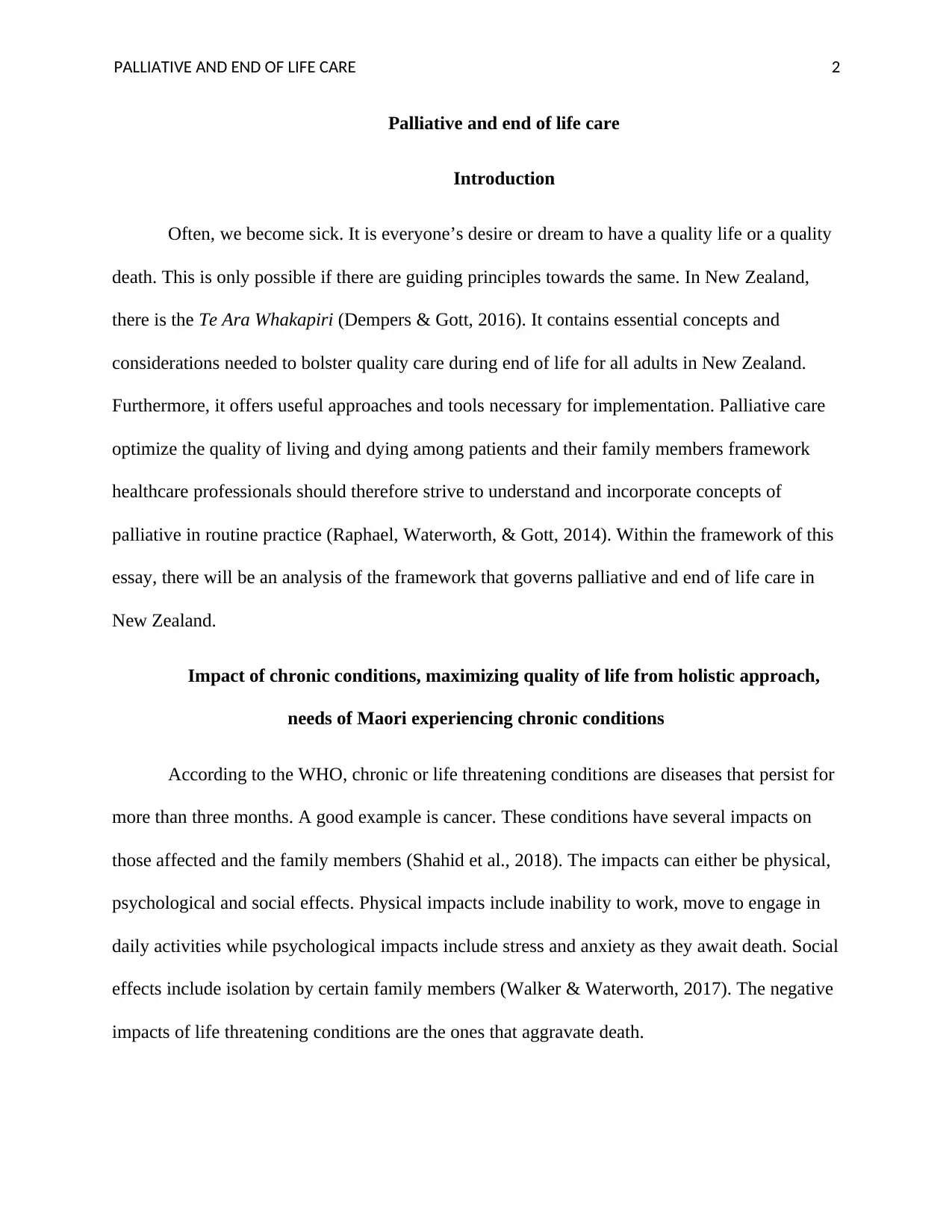
PALLIATIVE AND END OF LIFE CARE 2
Palliative and end of life care
Introduction
Often, we become sick. It is everyone’s desire or dream to have a quality life or a quality
death. This is only possible if there are guiding principles towards the same. In New Zealand,
there is the Te Ara Whakapiri (Dempers & Gott, 2016). It contains essential concepts and
considerations needed to bolster quality care during end of life for all adults in New Zealand.
Furthermore, it offers useful approaches and tools necessary for implementation. Palliative care
optimize the quality of living and dying among patients and their family members framework
healthcare professionals should therefore strive to understand and incorporate concepts of
palliative in routine practice (Raphael, Waterworth, & Gott, 2014). Within the framework of this
essay, there will be an analysis of the framework that governs palliative and end of life care in
New Zealand.
Impact of chronic conditions, maximizing quality of life from holistic approach,
needs of Maori experiencing chronic conditions
According to the WHO, chronic or life threatening conditions are diseases that persist for
more than three months. A good example is cancer. These conditions have several impacts on
those affected and the family members (Shahid et al., 2018). The impacts can either be physical,
psychological and social effects. Physical impacts include inability to work, move to engage in
daily activities while psychological impacts include stress and anxiety as they await death. Social
effects include isolation by certain family members (Walker & Waterworth, 2017). The negative
impacts of life threatening conditions are the ones that aggravate death.
Palliative and end of life care
Introduction
Often, we become sick. It is everyone’s desire or dream to have a quality life or a quality
death. This is only possible if there are guiding principles towards the same. In New Zealand,
there is the Te Ara Whakapiri (Dempers & Gott, 2016). It contains essential concepts and
considerations needed to bolster quality care during end of life for all adults in New Zealand.
Furthermore, it offers useful approaches and tools necessary for implementation. Palliative care
optimize the quality of living and dying among patients and their family members framework
healthcare professionals should therefore strive to understand and incorporate concepts of
palliative in routine practice (Raphael, Waterworth, & Gott, 2014). Within the framework of this
essay, there will be an analysis of the framework that governs palliative and end of life care in
New Zealand.
Impact of chronic conditions, maximizing quality of life from holistic approach,
needs of Maori experiencing chronic conditions
According to the WHO, chronic or life threatening conditions are diseases that persist for
more than three months. A good example is cancer. These conditions have several impacts on
those affected and the family members (Shahid et al., 2018). The impacts can either be physical,
psychological and social effects. Physical impacts include inability to work, move to engage in
daily activities while psychological impacts include stress and anxiety as they await death. Social
effects include isolation by certain family members (Walker & Waterworth, 2017). The negative
impacts of life threatening conditions are the ones that aggravate death.
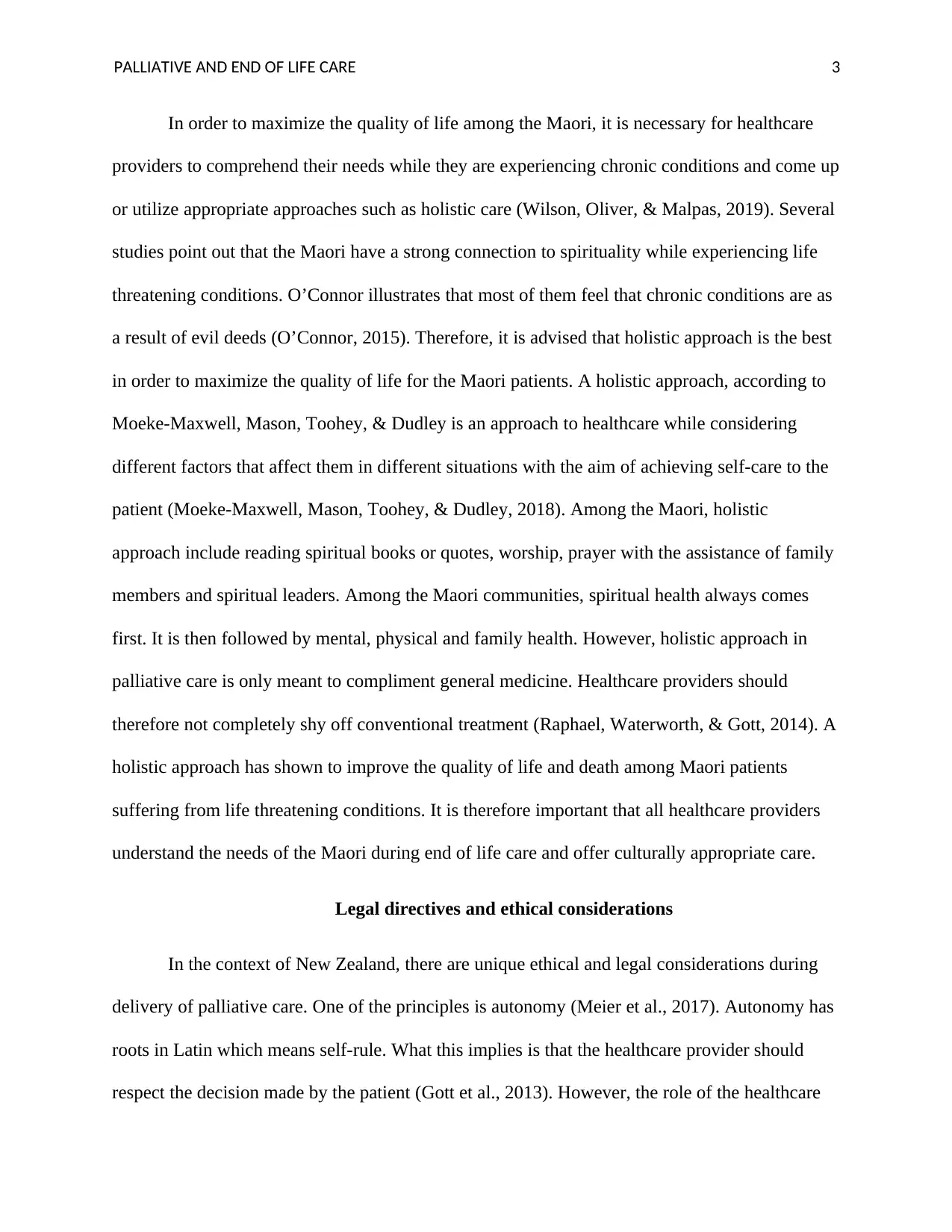
PALLIATIVE AND END OF LIFE CARE 3
In order to maximize the quality of life among the Maori, it is necessary for healthcare
providers to comprehend their needs while they are experiencing chronic conditions and come up
or utilize appropriate approaches such as holistic care (Wilson, Oliver, & Malpas, 2019). Several
studies point out that the Maori have a strong connection to spirituality while experiencing life
threatening conditions. O’Connor illustrates that most of them feel that chronic conditions are as
a result of evil deeds (O’Connor, 2015). Therefore, it is advised that holistic approach is the best
in order to maximize the quality of life for the Maori patients. A holistic approach, according to
Moeke-Maxwell, Mason, Toohey, & Dudley is an approach to healthcare while considering
different factors that affect them in different situations with the aim of achieving self-care to the
patient (Moeke-Maxwell, Mason, Toohey, & Dudley, 2018). Among the Maori, holistic
approach include reading spiritual books or quotes, worship, prayer with the assistance of family
members and spiritual leaders. Among the Maori communities, spiritual health always comes
first. It is then followed by mental, physical and family health. However, holistic approach in
palliative care is only meant to compliment general medicine. Healthcare providers should
therefore not completely shy off conventional treatment (Raphael, Waterworth, & Gott, 2014). A
holistic approach has shown to improve the quality of life and death among Maori patients
suffering from life threatening conditions. It is therefore important that all healthcare providers
understand the needs of the Maori during end of life care and offer culturally appropriate care.
Legal directives and ethical considerations
In the context of New Zealand, there are unique ethical and legal considerations during
delivery of palliative care. One of the principles is autonomy (Meier et al., 2017). Autonomy has
roots in Latin which means self-rule. What this implies is that the healthcare provider should
respect the decision made by the patient (Gott et al., 2013). However, the role of the healthcare
In order to maximize the quality of life among the Maori, it is necessary for healthcare
providers to comprehend their needs while they are experiencing chronic conditions and come up
or utilize appropriate approaches such as holistic care (Wilson, Oliver, & Malpas, 2019). Several
studies point out that the Maori have a strong connection to spirituality while experiencing life
threatening conditions. O’Connor illustrates that most of them feel that chronic conditions are as
a result of evil deeds (O’Connor, 2015). Therefore, it is advised that holistic approach is the best
in order to maximize the quality of life for the Maori patients. A holistic approach, according to
Moeke-Maxwell, Mason, Toohey, & Dudley is an approach to healthcare while considering
different factors that affect them in different situations with the aim of achieving self-care to the
patient (Moeke-Maxwell, Mason, Toohey, & Dudley, 2018). Among the Maori, holistic
approach include reading spiritual books or quotes, worship, prayer with the assistance of family
members and spiritual leaders. Among the Maori communities, spiritual health always comes
first. It is then followed by mental, physical and family health. However, holistic approach in
palliative care is only meant to compliment general medicine. Healthcare providers should
therefore not completely shy off conventional treatment (Raphael, Waterworth, & Gott, 2014). A
holistic approach has shown to improve the quality of life and death among Maori patients
suffering from life threatening conditions. It is therefore important that all healthcare providers
understand the needs of the Maori during end of life care and offer culturally appropriate care.
Legal directives and ethical considerations
In the context of New Zealand, there are unique ethical and legal considerations during
delivery of palliative care. One of the principles is autonomy (Meier et al., 2017). Autonomy has
roots in Latin which means self-rule. What this implies is that the healthcare provider should
respect the decision made by the patient (Gott et al., 2013). However, the role of the healthcare
⊘ This is a preview!⊘
Do you want full access?
Subscribe today to unlock all pages.

Trusted by 1+ million students worldwide
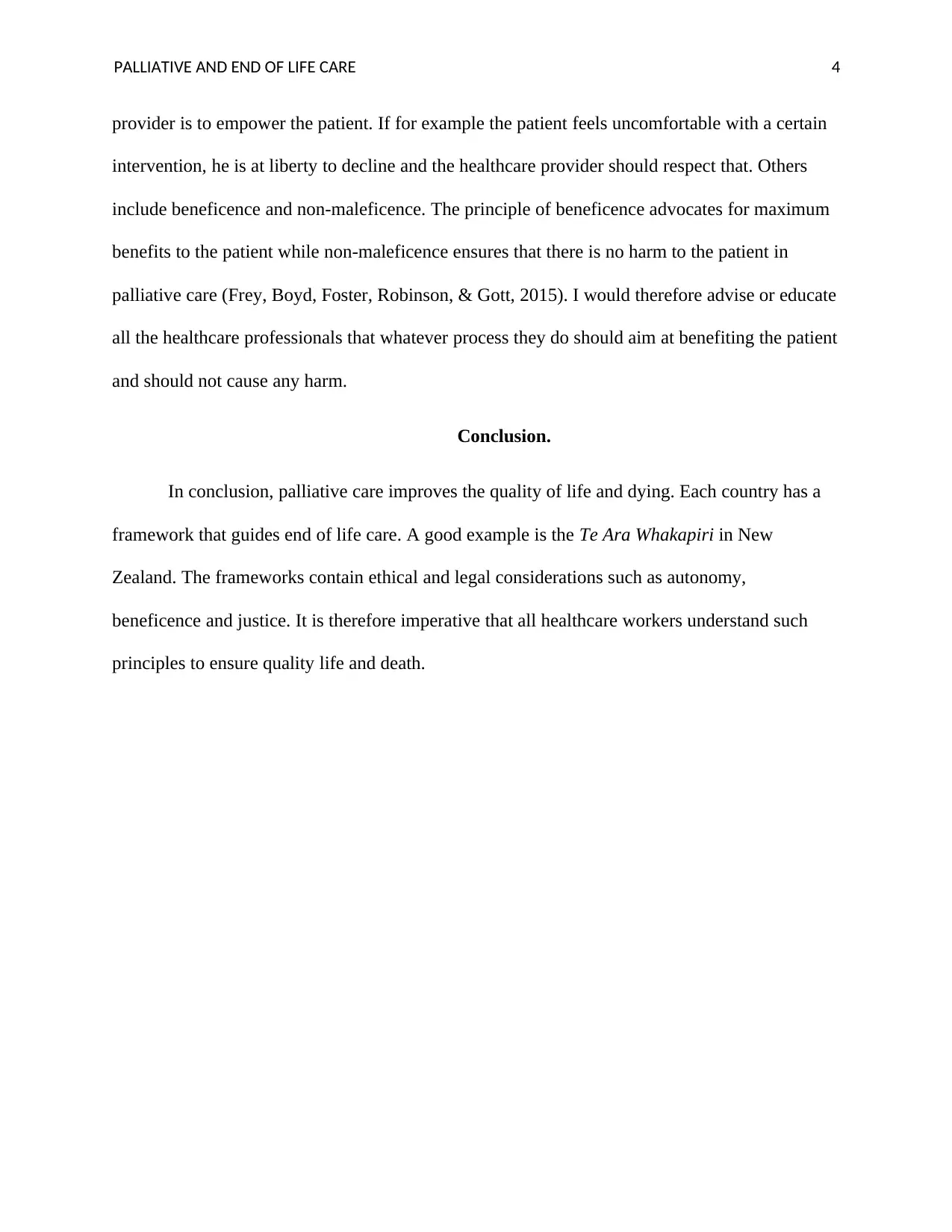
PALLIATIVE AND END OF LIFE CARE 4
provider is to empower the patient. If for example the patient feels uncomfortable with a certain
intervention, he is at liberty to decline and the healthcare provider should respect that. Others
include beneficence and non-maleficence. The principle of beneficence advocates for maximum
benefits to the patient while non-maleficence ensures that there is no harm to the patient in
palliative care (Frey, Boyd, Foster, Robinson, & Gott, 2015). I would therefore advise or educate
all the healthcare professionals that whatever process they do should aim at benefiting the patient
and should not cause any harm.
Conclusion.
In conclusion, palliative care improves the quality of life and dying. Each country has a
framework that guides end of life care. A good example is the Te Ara Whakapiri in New
Zealand. The frameworks contain ethical and legal considerations such as autonomy,
beneficence and justice. It is therefore imperative that all healthcare workers understand such
principles to ensure quality life and death.
provider is to empower the patient. If for example the patient feels uncomfortable with a certain
intervention, he is at liberty to decline and the healthcare provider should respect that. Others
include beneficence and non-maleficence. The principle of beneficence advocates for maximum
benefits to the patient while non-maleficence ensures that there is no harm to the patient in
palliative care (Frey, Boyd, Foster, Robinson, & Gott, 2015). I would therefore advise or educate
all the healthcare professionals that whatever process they do should aim at benefiting the patient
and should not cause any harm.
Conclusion.
In conclusion, palliative care improves the quality of life and dying. Each country has a
framework that guides end of life care. A good example is the Te Ara Whakapiri in New
Zealand. The frameworks contain ethical and legal considerations such as autonomy,
beneficence and justice. It is therefore imperative that all healthcare workers understand such
principles to ensure quality life and death.
Paraphrase This Document
Need a fresh take? Get an instant paraphrase of this document with our AI Paraphraser
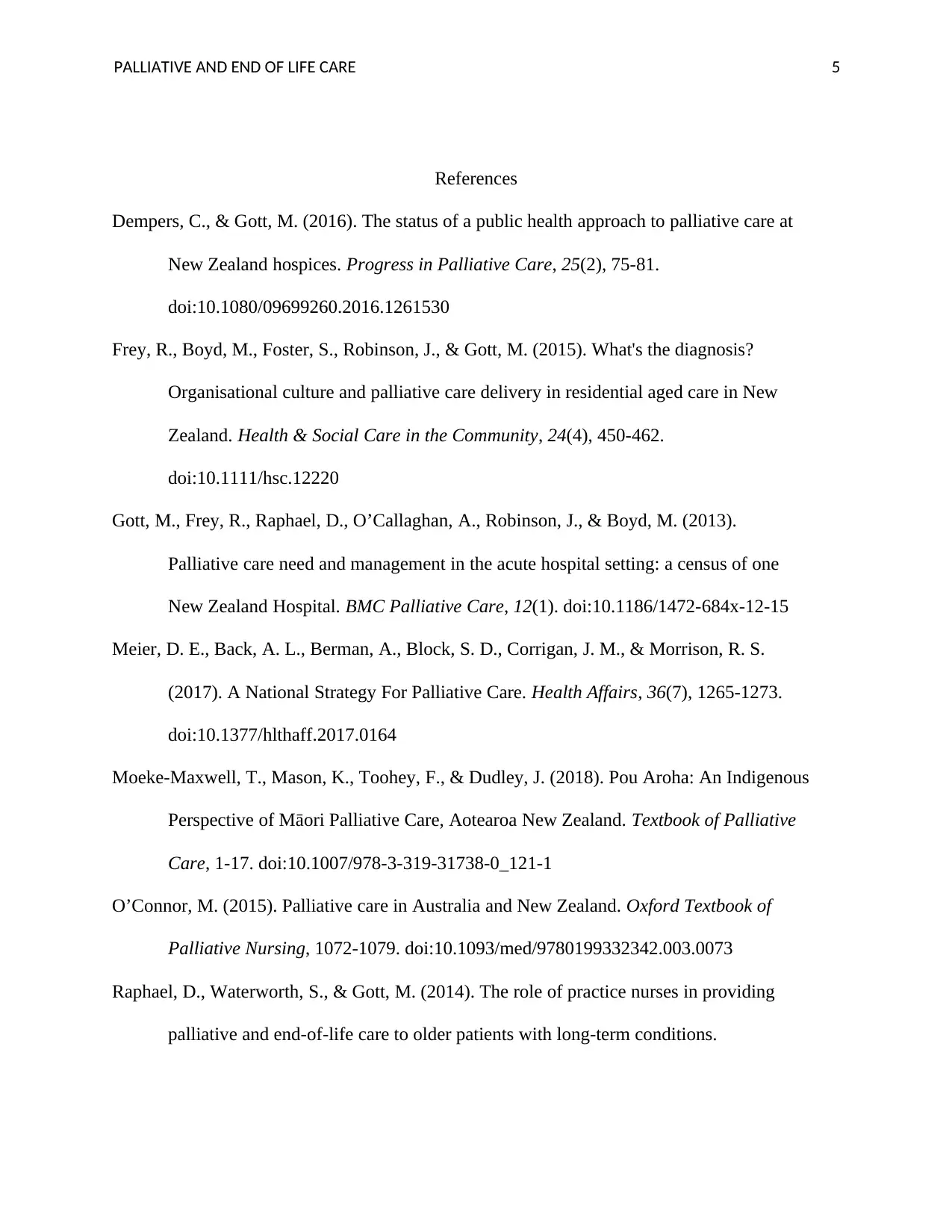
PALLIATIVE AND END OF LIFE CARE 5
References
Dempers, C., & Gott, M. (2016). The status of a public health approach to palliative care at
New Zealand hospices. Progress in Palliative Care, 25(2), 75-81.
doi:10.1080/09699260.2016.1261530
Frey, R., Boyd, M., Foster, S., Robinson, J., & Gott, M. (2015). What's the diagnosis?
Organisational culture and palliative care delivery in residential aged care in New
Zealand. Health & Social Care in the Community, 24(4), 450-462.
doi:10.1111/hsc.12220
Gott, M., Frey, R., Raphael, D., O’Callaghan, A., Robinson, J., & Boyd, M. (2013).
Palliative care need and management in the acute hospital setting: a census of one
New Zealand Hospital. BMC Palliative Care, 12(1). doi:10.1186/1472-684x-12-15
Meier, D. E., Back, A. L., Berman, A., Block, S. D., Corrigan, J. M., & Morrison, R. S.
(2017). A National Strategy For Palliative Care. Health Affairs, 36(7), 1265-1273.
doi:10.1377/hlthaff.2017.0164
Moeke-Maxwell, T., Mason, K., Toohey, F., & Dudley, J. (2018). Pou Aroha: An Indigenous
Perspective of Māori Palliative Care, Aotearoa New Zealand. Textbook of Palliative
Care, 1-17. doi:10.1007/978-3-319-31738-0_121-1
O’Connor, M. (2015). Palliative care in Australia and New Zealand. Oxford Textbook of
Palliative Nursing, 1072-1079. doi:10.1093/med/9780199332342.003.0073
Raphael, D., Waterworth, S., & Gott, M. (2014). The role of practice nurses in providing
palliative and end-of-life care to older patients with long-term conditions.
References
Dempers, C., & Gott, M. (2016). The status of a public health approach to palliative care at
New Zealand hospices. Progress in Palliative Care, 25(2), 75-81.
doi:10.1080/09699260.2016.1261530
Frey, R., Boyd, M., Foster, S., Robinson, J., & Gott, M. (2015). What's the diagnosis?
Organisational culture and palliative care delivery in residential aged care in New
Zealand. Health & Social Care in the Community, 24(4), 450-462.
doi:10.1111/hsc.12220
Gott, M., Frey, R., Raphael, D., O’Callaghan, A., Robinson, J., & Boyd, M. (2013).
Palliative care need and management in the acute hospital setting: a census of one
New Zealand Hospital. BMC Palliative Care, 12(1). doi:10.1186/1472-684x-12-15
Meier, D. E., Back, A. L., Berman, A., Block, S. D., Corrigan, J. M., & Morrison, R. S.
(2017). A National Strategy For Palliative Care. Health Affairs, 36(7), 1265-1273.
doi:10.1377/hlthaff.2017.0164
Moeke-Maxwell, T., Mason, K., Toohey, F., & Dudley, J. (2018). Pou Aroha: An Indigenous
Perspective of Māori Palliative Care, Aotearoa New Zealand. Textbook of Palliative
Care, 1-17. doi:10.1007/978-3-319-31738-0_121-1
O’Connor, M. (2015). Palliative care in Australia and New Zealand. Oxford Textbook of
Palliative Nursing, 1072-1079. doi:10.1093/med/9780199332342.003.0073
Raphael, D., Waterworth, S., & Gott, M. (2014). The role of practice nurses in providing
palliative and end-of-life care to older patients with long-term conditions.
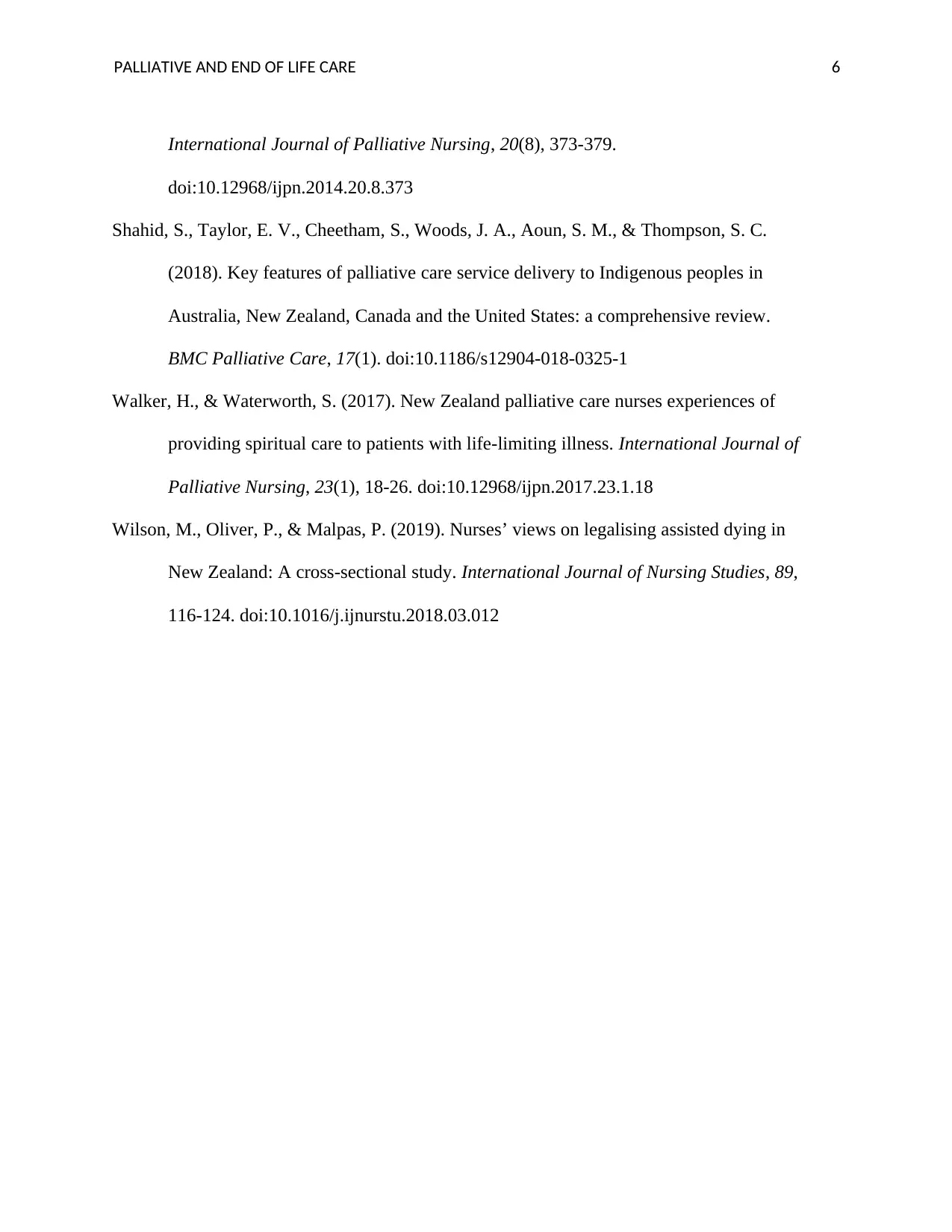
PALLIATIVE AND END OF LIFE CARE 6
International Journal of Palliative Nursing, 20(8), 373-379.
doi:10.12968/ijpn.2014.20.8.373
Shahid, S., Taylor, E. V., Cheetham, S., Woods, J. A., Aoun, S. M., & Thompson, S. C.
(2018). Key features of palliative care service delivery to Indigenous peoples in
Australia, New Zealand, Canada and the United States: a comprehensive review.
BMC Palliative Care, 17(1). doi:10.1186/s12904-018-0325-1
Walker, H., & Waterworth, S. (2017). New Zealand palliative care nurses experiences of
providing spiritual care to patients with life-limiting illness. International Journal of
Palliative Nursing, 23(1), 18-26. doi:10.12968/ijpn.2017.23.1.18
Wilson, M., Oliver, P., & Malpas, P. (2019). Nurses’ views on legalising assisted dying in
New Zealand: A cross-sectional study. International Journal of Nursing Studies, 89,
116-124. doi:10.1016/j.ijnurstu.2018.03.012
International Journal of Palliative Nursing, 20(8), 373-379.
doi:10.12968/ijpn.2014.20.8.373
Shahid, S., Taylor, E. V., Cheetham, S., Woods, J. A., Aoun, S. M., & Thompson, S. C.
(2018). Key features of palliative care service delivery to Indigenous peoples in
Australia, New Zealand, Canada and the United States: a comprehensive review.
BMC Palliative Care, 17(1). doi:10.1186/s12904-018-0325-1
Walker, H., & Waterworth, S. (2017). New Zealand palliative care nurses experiences of
providing spiritual care to patients with life-limiting illness. International Journal of
Palliative Nursing, 23(1), 18-26. doi:10.12968/ijpn.2017.23.1.18
Wilson, M., Oliver, P., & Malpas, P. (2019). Nurses’ views on legalising assisted dying in
New Zealand: A cross-sectional study. International Journal of Nursing Studies, 89,
116-124. doi:10.1016/j.ijnurstu.2018.03.012
⊘ This is a preview!⊘
Do you want full access?
Subscribe today to unlock all pages.

Trusted by 1+ million students worldwide
1 out of 6
Related Documents
Your All-in-One AI-Powered Toolkit for Academic Success.
+13062052269
info@desklib.com
Available 24*7 on WhatsApp / Email
![[object Object]](/_next/static/media/star-bottom.7253800d.svg)
Unlock your academic potential
Copyright © 2020–2026 A2Z Services. All Rights Reserved. Developed and managed by ZUCOL.





